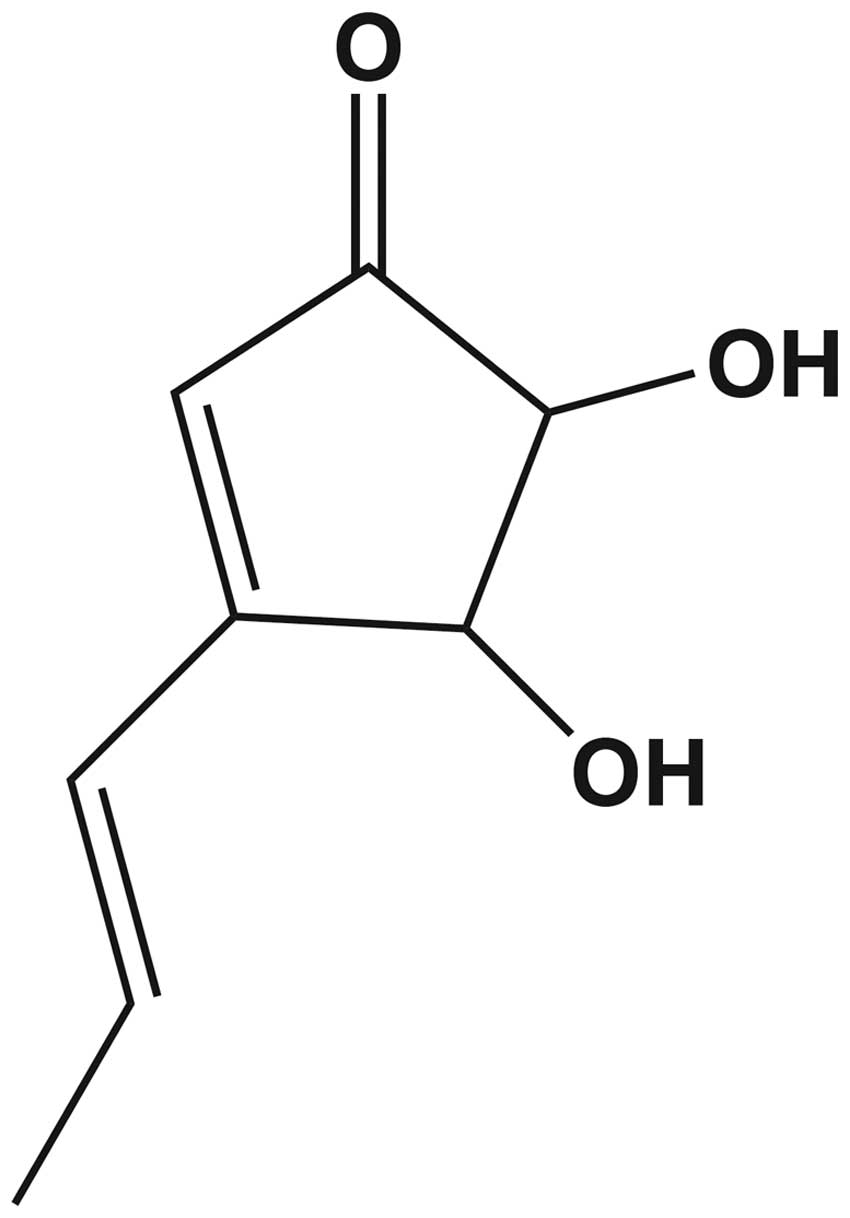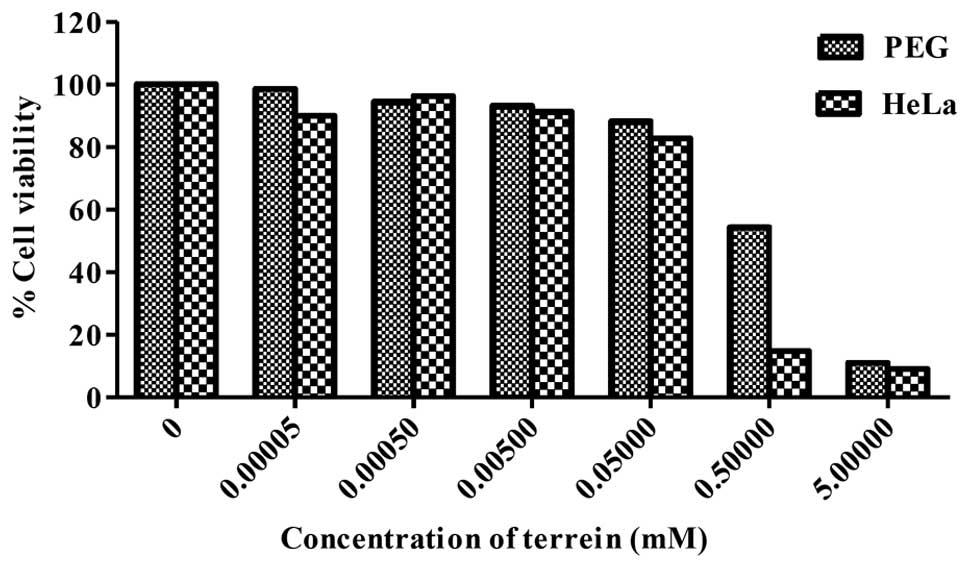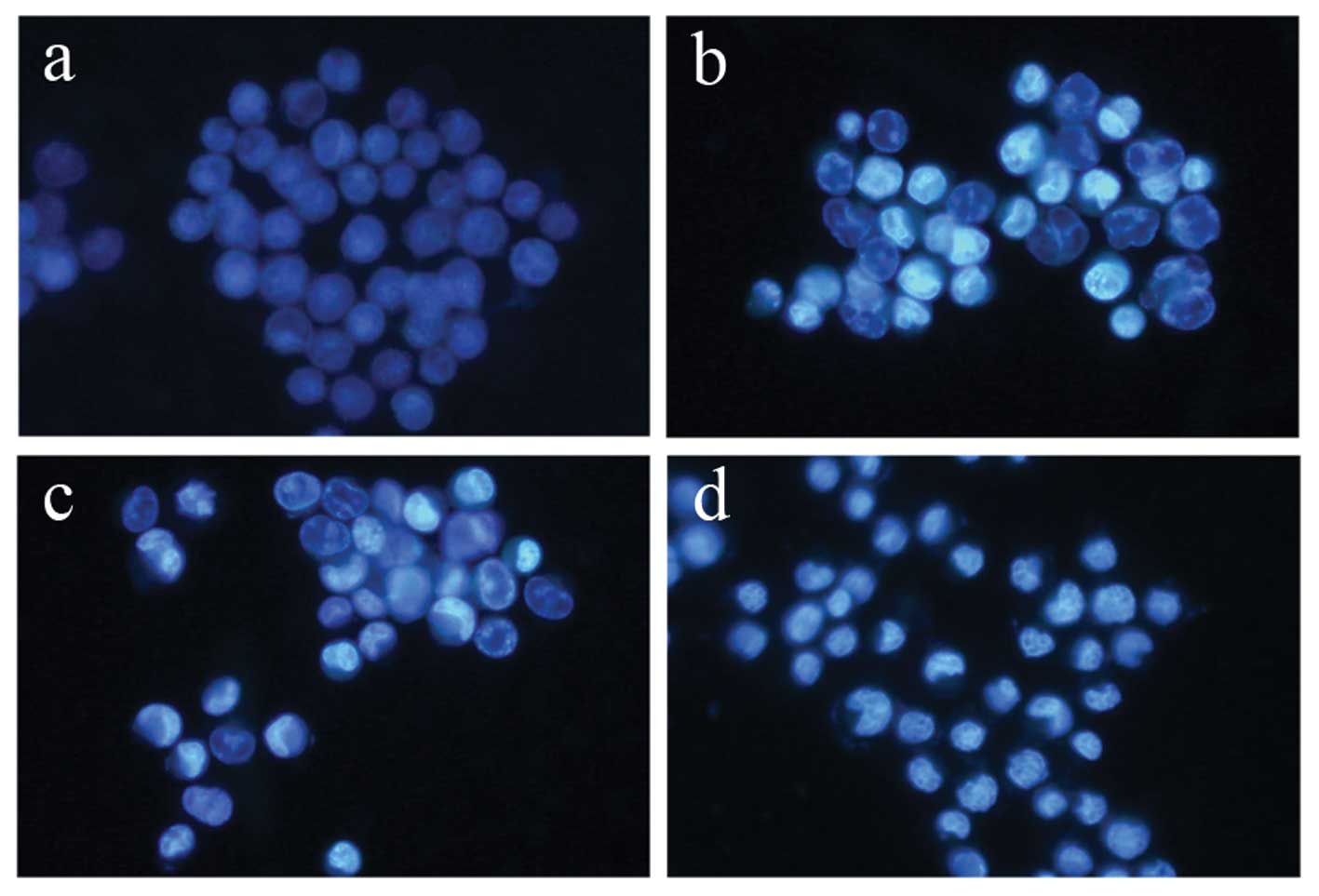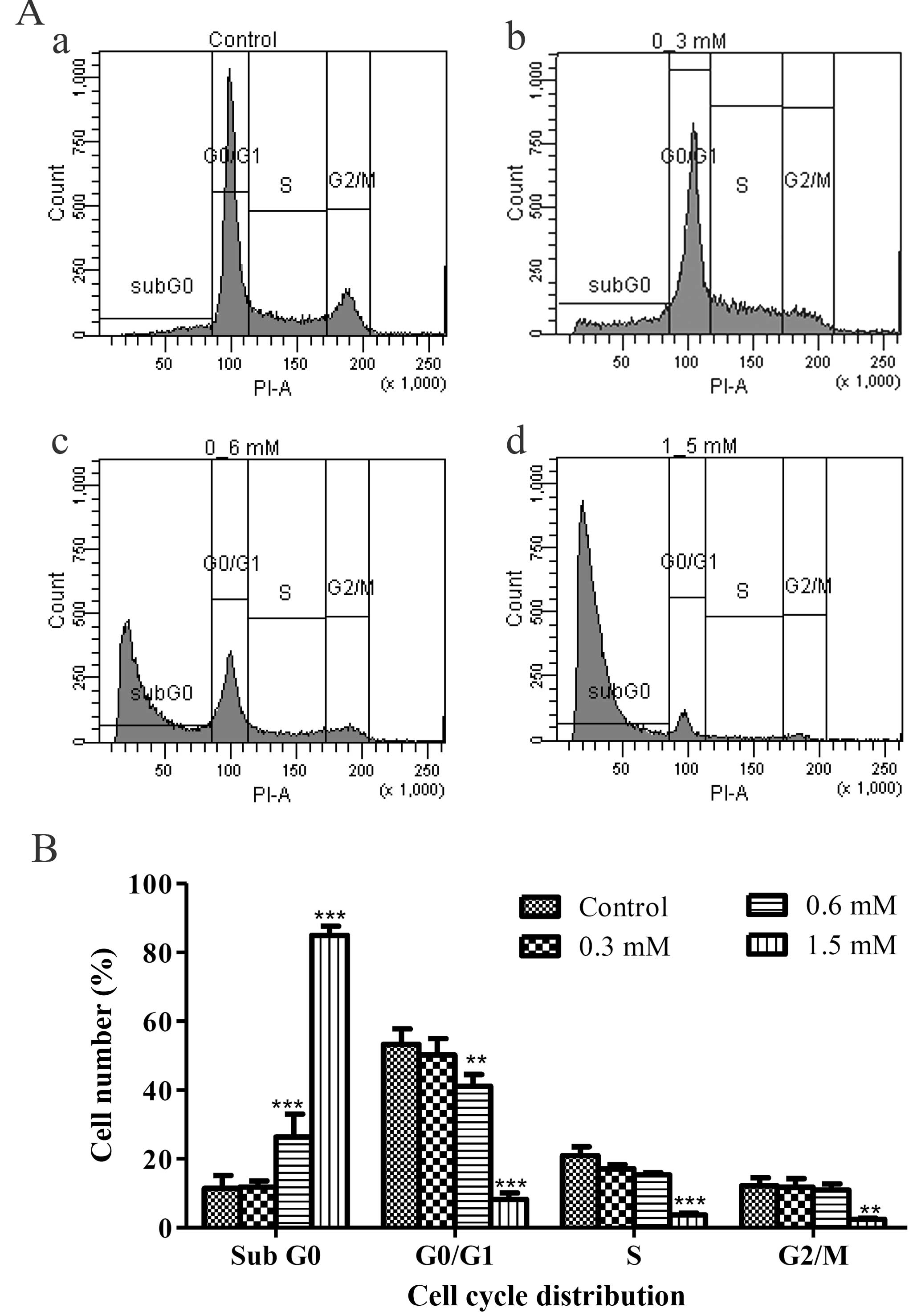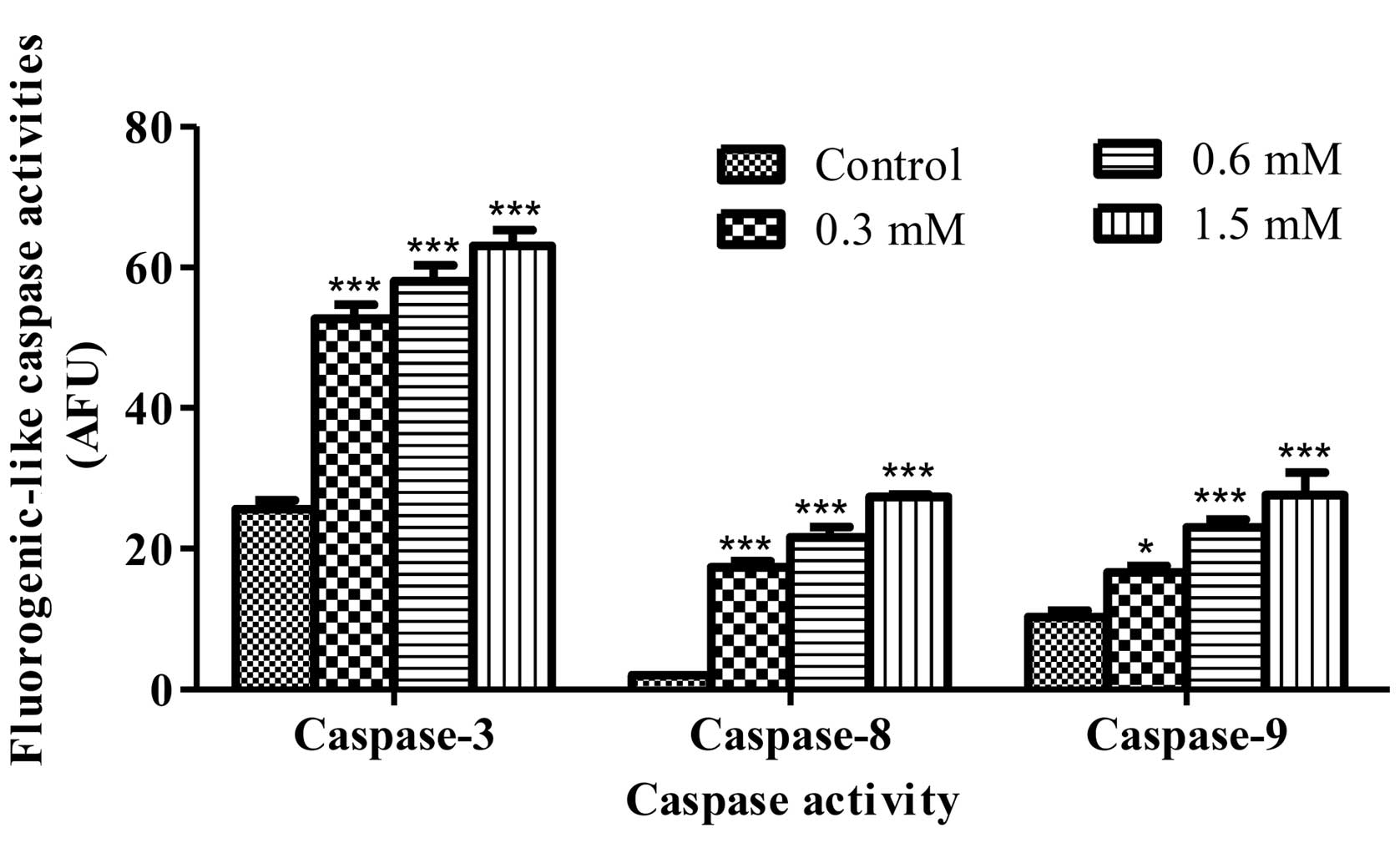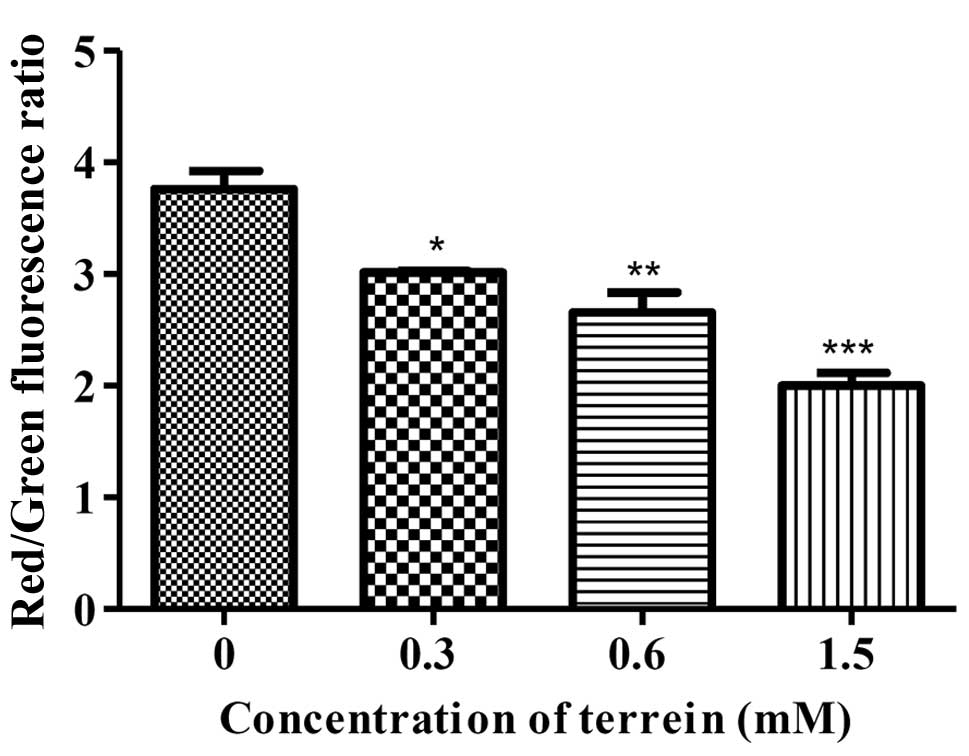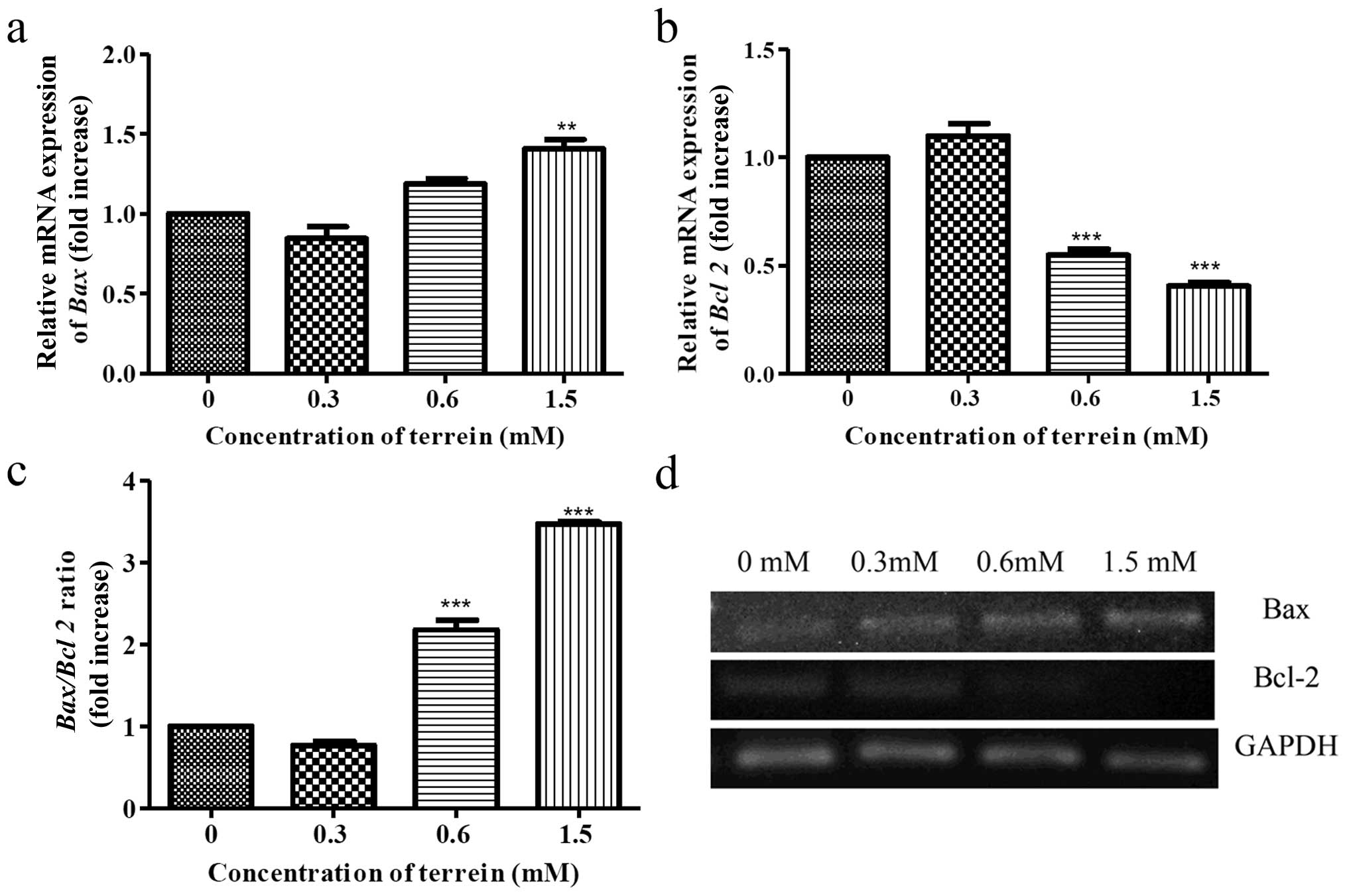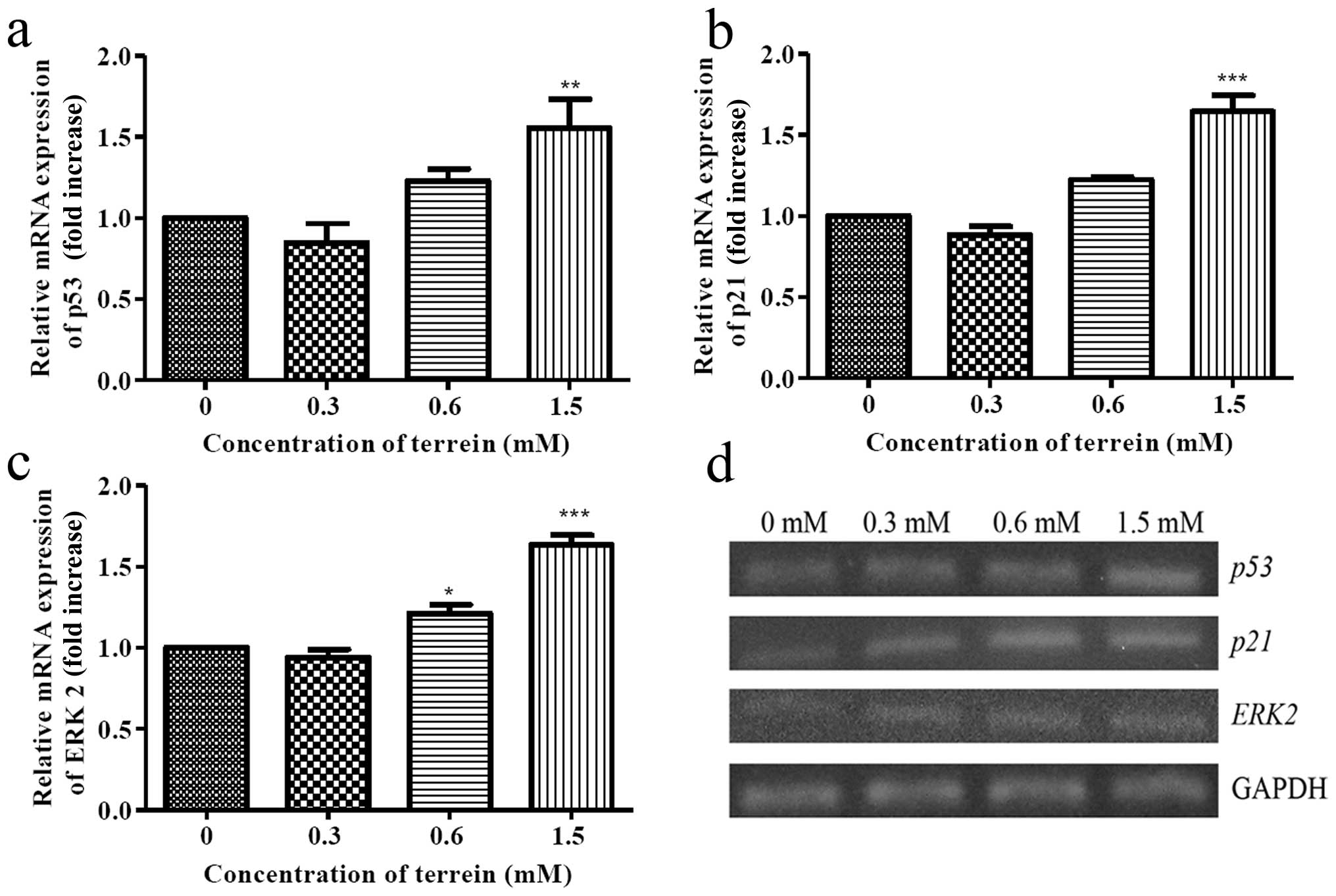|
1
|
Jit M, Demarteau N, Elbasha E, Ginsberg G,
Kim J, Praditsitthikorn N, Sinanovic E and Hutubessy R: Human
papillomavirus vaccine introduction in low-income and middle-income
countries: guidance on the use of cost-effectiveness models. BMC
Med. 54:2–9. 2011.PubMed/NCBI
|
|
2
|
Thomas GM: Improved treatment for cervical
cancer-concurrent chemotherapy and radiotherapy. N Engl J Med.
340:1198–1200. 1999. View Article : Google Scholar : PubMed/NCBI
|
|
3
|
Ren G, Zhao YP, Yang L and Fu CX:
Anti-proliferative effect of clitocine from the mushroom
Leucopaxillus giganteus on human cervical cancer HeLa cells
by inducing apoptosis. Cancer Lett. 262:190–200. 2008. View Article : Google Scholar : PubMed/NCBI
|
|
4
|
Park SJ, Wu CH, Gordon JD, Zhong X, Emami
A and Safa AR: Taxol induces caspase-10-dependent apoptosis. J Biol
Chem. 279:51057–51067. 2004. View Article : Google Scholar : PubMed/NCBI
|
|
5
|
Wang S, Konorev EA, Kotamraju S, Joseph J,
Kalivendi S and Kalyanaraman B: Doxorubicin induces apoptosis in
normal and tumor cells via distinctly different mechanisms. J Biol
Chem. 279:25535–25543. 2004. View Article : Google Scholar : PubMed/NCBI
|
|
6
|
Day TW, Wu CH and Safa AR: Etoposide
induces protein kinase Cδ- and caspase-3 dependent apoptosis in
neuroblastoma cancer cells. Mol Pharmacol. 76:632–640. 2009.
|
|
7
|
Tanida S, Mizoshita T, Ozeki K, Tsukamoto
H, Kamiya T, Kataoka H, Sakamuro D and Joh T: Mechanisms of
cisplatin-induced apoptosis and of cisplatin sensitivity: potential
of BIN1 to act as a potent predictor of cisplatin sensitivity in
gastric cancer treatment. Int J Surg Oncol.
2012:8628792012.PubMed/NCBI
|
|
8
|
Newman DJ and Cragg GM: Microbial
antitumor drugs: natural products of microbial origin as anticancer
agents. Curr Opin Investig Drugs. 10:1280–1296. 2009.PubMed/NCBI
|
|
9
|
Raistrick H and Smith G: Studies in the
biochemistry of micro-organisms: the metabolic products of
Aspergillus terreus Thom. A new mould metabolic
product-terrein. Biochem J. 29:606–611. 1935.PubMed/NCBI
|
|
10
|
Demasi M, Felicio AL, Pacheco AO, Leite
HG, Lima C and Andrade LH: Studies on terrein as a new class of
proteasome inhibitors. J Braz Chem Soc. 21:299–305. 2010.
View Article : Google Scholar
|
|
11
|
Park SH, Kim DS, Kim WG, Ryoo IJ, Lee DH,
Huh CH, Youn SW, Yoo ID and Park KC: Terrein: a new melanogenesis
inhibitor and its mechanism. Cell Mol Life Sci. 61:2878–2885. 2004.
View Article : Google Scholar : PubMed/NCBI
|
|
12
|
Kim DS, Lee S, Lee HK, Park SH, Ryoo IJ,
Yoo ID, Kwon SB, Baek KJ, Na JI and Park KC: The hypopigmentary
action of KI-063 (a new tyrosinase inhibitor) combined with
terrein. J Pharm Pharmacol. 60:343–348. 2008. View Article : Google Scholar : PubMed/NCBI
|
|
13
|
Lee JC, Yu MK, Lee R, Lee YH, Jeon JG, Lee
MH, Jhee EC, Yoo ID and Yi HK: Terrein reduces pulpal inflammation
in human dental pulp cells. J Endod. 34:433–437. 2008. View Article : Google Scholar : PubMed/NCBI
|
|
14
|
Lee YH, Lee NH, Bhattarai G, Oh YT, Yu MK,
Yoo ID, Jhee EC and Yi HK: Enhancement of osteoblast
biocompatibility on titanium surface with Terrein treatment. Cell
Biochem Funct. 28:678–685. 2010. View
Article : Google Scholar : PubMed/NCBI
|
|
15
|
Kim DS, Lee HK, Park SH, Lee S, Ryoo IJ,
Kim WG, Yoo ID, Na JI, Kwon SB and Park KC: Terrein inhibits
keratinocyte proliferation via ERK inactivation and G2/M cell cycle
arrest. Exp Dermatol. 17:312–317. 2007. View Article : Google Scholar : PubMed/NCBI
|
|
16
|
Arakawa M, Someno T, Kawada M and Ikeda D:
A new terrein glucoside, a novel inhibitor of angiogenin secretion
in tumor angiogenesis. J Antibiot. 61:442–448. 2008. View Article : Google Scholar : PubMed/NCBI
|
|
17
|
Liao WY, Shen CN, Lin LH, Yang YL, Han HY,
Chen JW, Kuo SC, Wu SH and Liaw CC: Asperjinone, a nor-neolignan,
and terrein, a suppressor of ABCG2-expressing breast cancer cells,
from thermophilic Aspergillus terreus. J Nat Prod.
75:630–635. 2012. View Article : Google Scholar : PubMed/NCBI
|
|
18
|
Uthaisang W, Reutrakul V, Krachangchaeng
C, Wilairat P and Fadeel B: VR-3848, a novel peptide derived from
Euphobiaceae, induces mitochondria-dependent apoptosis in
human leukemia cells. Cancer Lett. 208:171–178. 2004. View Article : Google Scholar : PubMed/NCBI
|
|
19
|
Oubrahim H, Stadtman ER and Chock PB:
Mitochondria play no roles in Mn(II)-induced apoptosis in HeLa
cells. Proc Natl Acad Sci USA. 98:9505–9510. 2001. View Article : Google Scholar : PubMed/NCBI
|
|
20
|
Feng Q, Cao HL, Xu W, Li XR, Ren YQ and Du
LF: Apoptosis induced by genipin in human leukemia K562 cells:
involvement of c-Jun N-terminal kinase in G2/M arrest. Acta
Pharmacol Sin. 31:519–527. 2011. View Article : Google Scholar : PubMed/NCBI
|
|
21
|
Cossarizza A, Baccarani CM, Kalashnikova G
and Franceschi C: A new method for the cytofluorimetric analysis of
mitochondrial membrane potential using the J-aggregate forming
lipophilic cation
5,5′,6,6′-tetrachloro-1,1′,3,3′-tetraethylbenzimidazolcarbocyanine
iodide (JC-1). Biochem Biophys Res Commun. 197:40–45.
1993.PubMed/NCBI
|
|
22
|
Gomez-Lazaro M, Galindo MF, Concannon CG,
Segura MF, Fernandez-Gomez FJ, Llecha N, Comella JX, Prehn JH and
Jordan J: 6-Hydroxydopamine activates the mitochondrial apoptosis
pathway through p38 MAPK-mediated, p53-independent activation of
Bax and PUMA. J Neurochem. 104:1599–1612. 2008. View Article : Google Scholar : PubMed/NCBI
|
|
23
|
Puerto HLD, Martins AS, Milsted A,
Souza-Fagundes EM, Braz GF, Hissa B, Andrade LO, Alves F, Rajão DS,
Leite RC and Vasconcelos AC: Canine distemper virus induces
apoptosis in cervical tumor derived cell lines. Virol J. 334:2–7.
2011.PubMed/NCBI
|
|
24
|
Elmore S: Apoptosis: a review of
programmed cell death. Toxicol Pathol. 35:495–516. 2007. View Article : Google Scholar : PubMed/NCBI
|
|
25
|
Ashkenazi A: Targeting the extrinsic
apoptosis pathway in cancer. Cytokine Growth Factor Rev.
19:325–331. 2008. View Article : Google Scholar : PubMed/NCBI
|
|
26
|
Gu Q, Wang JD, Xia HHX, Lin MC, He H, Zou
B, Tu SP, Yang Y, Liu XG, Lam SK, Wong WM, Chan AO, Yuen MF, Kung
HF and Wong BC: Activation of the caspase-8/Bid and Bax pathways in
aspirin-induced apoptosis in gastric cancer. Carcinogenesis.
26:541–546. 2005. View Article : Google Scholar : PubMed/NCBI
|
|
27
|
Budihardjo I, Oliver H, Lutter M, Luo X
and Wang X: Biochemical pathways of caspase activation during
apoptosis. Annu Rev Cell Dev Biol. 15:269–290. 1999. View Article : Google Scholar : PubMed/NCBI
|
|
28
|
Ghobrial IM, Witzig TE and Adjei AA:
Targeting apoptosis pathways in cancer therapy. CA Cancer J Clin.
55:178–194. 2005. View Article : Google Scholar : PubMed/NCBI
|
|
29
|
Jin Z, Li Y, Pitti R, Lawrence D, Pham VC,
Lill JR and Ashkenazi A: Cullin3-based polyubiquitination and
p62-dependent aggregation of caspase-8 mediate extrinsic apoptosis
signaling. Cell. 137:721–735. 2009. View Article : Google Scholar : PubMed/NCBI
|
|
30
|
Kim SH, Kim SH, Lee SC and Song YS:
Involvement of both extrinsic and intrinsic apoptotic pathways in
apoptosis induced by genistein in human cervical cancer cells. Ann
NY Acad Sci. 1171:196–201. 2009. View Article : Google Scholar : PubMed/NCBI
|
|
31
|
Hougardy BM, van der Zee AG, van den
Heuvel FA, Timmer T, de Vries EG and de Jong S: Sensitivity to
Fas-mediated apoptosis in high-risk HPV-positive human cervical
cancer cells: relationship with Fas, caspase-8, and Bid. Gynecol
Oncol. 97:353–364. 2005. View Article : Google Scholar : PubMed/NCBI
|
|
32
|
Gross A, Jockel J, Wei MC and Korsmeyer
SJ: Enforced dimerization of BAX results in its translocation,
mitochondrial dysfunction and apoptosis. EMBO J. 17:3878–3885.
1998. View Article : Google Scholar : PubMed/NCBI
|
|
33
|
Yang W, Gong X, Zhao X, An W, Wang X and
Wang M: Capsaicin induces apoptosis in HeLa cells via Bax/Bcl-2 and
caspase-3 pathways. Asian J Traditional Med. 1:3–4. 2006.
|
|
34
|
Mahfudh N and Pihie AHL: Eurycomanone
induces apoptosis through the up-regulation of p53 in human
cervical carcinoma cells. J Cancer Mol. 4:109–115. 2008.
|
|
35
|
Priyadarsini RV, Murugan RS, Maitreyi S,
Ramalingam K, Karunagaran D and Nagini S: The flavonoid quercetin
induces cell cycle arrest and mitochondria-mediated apoptosis in
human cervical cancer (HeLa) cells through p53 induction and NF-κB
inhibition. Eur J Pharmacol. 649:84–91. 2010.PubMed/NCBI
|
|
36
|
Xu W, Liu J, Li C, Wu HZ and Liu YW:
Kaempferol-7-O-β-D-glucoside (KG) isolated from Smilax
china L. rhizome induces G2/M phase arrest and
apoptosis on HeLa cells in a p53-independent manner. Cancer Lett.
264:229–240. 2008.
|
|
37
|
Wang X, Martindale JL and Holbrook NJ:
Requirement for ERK activation in cisplatin-induced apoptosis. J
Biol Chem. 275:39435–39443. 2000. View Article : Google Scholar
|
|
38
|
Yeh PY, Chuang SE, Yeh KH, Song YC, Chang
LLY and Cheng AL: Phosphorylation of p53 on Thr55 by ERK2 is
necessary for doxorubicin-induced p53 activation and cell death.
Oncogene. 23:3580–3588. 2004. View Article : Google Scholar : PubMed/NCBI
|
|
39
|
Wu Z, Wu LJ, Tashiro S, Onodera S and
Ikejima T: Phosphorylated extracellular signal-regulated kinase
up-regulated p53 expression in shikonin-induced HeLa cell
apoptosis. Chin Med J. 118:671–677. 2005.PubMed/NCBI
|
|
40
|
Singh M, Sharma H and Singh N: Hydrogen
peroxide induces apoptosis in HeLa cells through mitochondrial
pathway. Mitochondrion. 7:367–373. 2007. View Article : Google Scholar : PubMed/NCBI
|
|
41
|
Zhuang S and Schnellmann RG: A
death-promoting role for extracellular signal-regulated kinase. J
Pharmacol Exp Ther. 319:991–997. 2006. View Article : Google Scholar : PubMed/NCBI
|
|
42
|
Cagnol S and Chambard JC: ERK and cell
death: mechanisms of ERK-induced cell death-apoptosis, autophagy
and senescence. FEBS J. 277:2–21. 2010. View Article : Google Scholar : PubMed/NCBI
|















